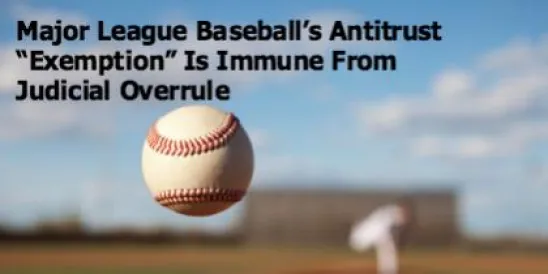The City of San Jose, California, entered into an option contract to lease land to the Oakland A’s, a Major League Baseball (“MLB”) club, for the construction of a new stadium. The land was within the exclusive territory of another MLB club, the San Francisco Giants, who refused to waive their right under MLB’s Constitution to territorial exclusivity. The City sued MLB under the antitrust laws for not putting repeal of that constitutional provision up for a vote by all of the teams belonging to MLB, despite repeated demands by the City that it do so. City of San Jose v. Office of the Commissioner of Baseball, __ F.Supp.2d __, 2013 WL 5609346, Case No. C-13-02787 RMW (N.D. Cal., Oct. 11, 2013).
The MLB defendants moved for dismissal for failure to state a claim on two grounds, one being that the City lacked antitrust standing to sue, but the Court does not reach that issue. City of San Jose, 2013 WL 5609346 at 11-12. Instead, the Court granted a Rule 12(b)(6) motion to dismiss without leave to amend based on MLB’s “exemption” from enforcement under the antitrust laws.
The exemption came into being when Justice Holmes authored an opinion dismissing a Section 2 Sherman Act conspiracy claim because MLB did not participate in interstate commerce. Federal Base Ball Club of Baltimore, Inc. v. National League of Base Ball Clubs, 259 U.S. 200 (1922). The Court stated that the games were entirely intrastate (id. at 208: “The business is giving exhibitions of base ball, which are purely state affairs”), and that the travel between States by teams was not the game itself, and so did not place baseball in interstate commerce. Id. at 209 (“the transport is a mere incident, not the essential thing”).
In City of San Jose, Judge Whyte provides a thorough history of MLB’s antitrust immunity. In brief, the Supreme Court has called the Federal Base Ball decision “unrealistic, inconsistent” and “illogical.” Radovich v. National Football League, 352 U.S. 445, 452 (1957); Salerno v. American League of Professional Baseball Clubs, 429 F.2d 1003, 1005 (2d Cir. 1970) (Friendly, J.: “Federal Baseball was not one of Mr. Justice Holmes’ happiest days”). The Court has refused to follow its reasoning to exempt any other major sport besides MLB from the antitrust laws. U.S. v. Int’l Boxing Club, 348 U.S. 236 (1955) (boxing); Radovich, 352 U.S. at 450-51 (football). The Court has also expressly overruled the holding in Federal Base Ballon the interstate commerce issue. Flood v. Kuhn, 407 U.S. 258, 282 (1972) (“Professional baseball is a business and it is engaged in interstate commerce”). The reach of the Sherman Act is now considered coextensive with the power of Congress under the Commerce Clause. Antitrust Law Developments 44 (ABA 7TH ed. 2012); e.g., McLain v. Real Estate Bd. of New Orleans, 444 U.S. 232, 241-242 (1980).
Judge Whyte nonetheless ruled that the exemption for “the business of baseball” remains in force. He noted that the Supreme Court has never eliminated the exemption, despite discussing it in five opinions. City of San Jose, 2013 WL 5609346 at 6-7. Further, MLB has acted in reliance on its immunity for many decades in developing and expanding its product. Flood, 407 U.S. at 282-283. A court eliminating the exemption could have “retroactive effect.” Flood, at 281 (discussing “the retroactivity problems that inevitably would result with a judicial overturning of Federal Baseball”).
Like the courts, Congress has also left the immunity created in Federal Base Ball untouched for nearly one hundred years. Judge Whyte ruled that this Congressional inaction reveals that Congress intends that the exemption remain unchanged. City of San Jose, 2013 WL 5609346 at 10. In addition, when Congress passed a law in response to the Flood decision on the “reserve clause,” which had prevented players from seeking employment with competing teams, Congress had taken care to state that it was not thereby providing for antitrust challenges to the “location or relocation” of MLB teams, and so “Congress explicitly preserved the exemption” for such MLB decisions. Id. at 10 (citation omitted).
The exemption presents an issue that concerns the proper role of the judiciary, not an issue of antitrust law. City of San Jose, 2013 WL 5609346 at 9. Judge Whyte concluded, as did the Supreme Court, that whether to repeal the exemption, and the form the repeal should take, are issues for Congress, not the courts. Flood, 407 U.S. at 284 (“it is an inconsistency . . . of long standing that is to be remedied by Congress and not this Court”). Congress is particularly competent to legislate in the area. Radovich, 352 U.S. at 452 (“Congressional processes are more accommodative, affording the whole industry hearings and an opportunity to assist in the formulation of new legislation” and “[t]he resulting product is therefore more likely to protect the industry and the public alike”).
The City also argued that, even if an exemption survived, the location of teams’ parks was not integral to the “the business of baseball.” Judge Whyte disagreed, holding that location was “an issue of league structure that . . . falls squarely within the exemption.” City of San Jose, 2013 WL 5609346 at 11.
The City of San Jose court also dismisses the City’s state law Cartwright Act antitrust claims because “national uniformity is required.” City of San Jose, 2013 WL 5609346 at 12 (citation omitted).


 />i
/>i

